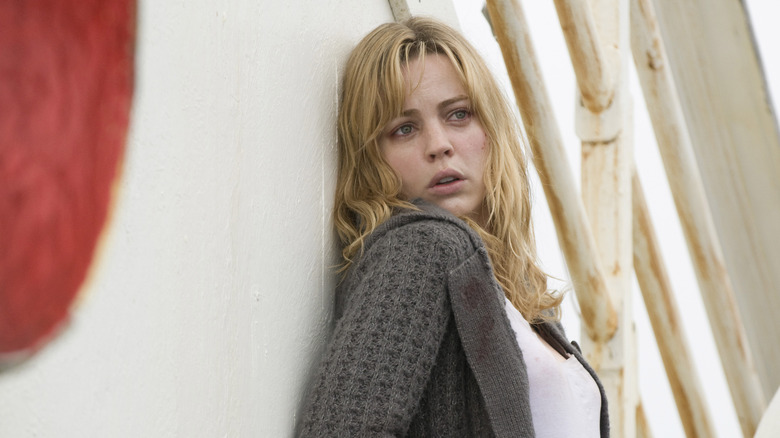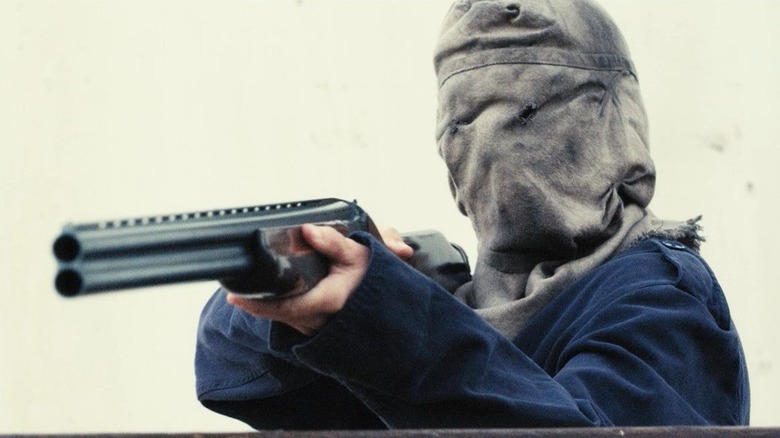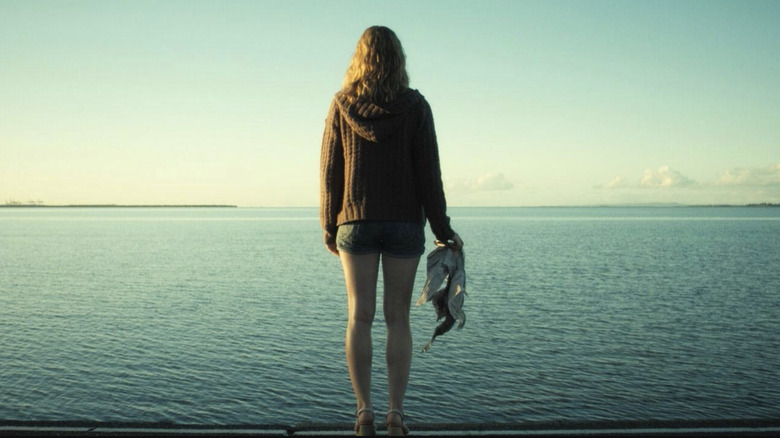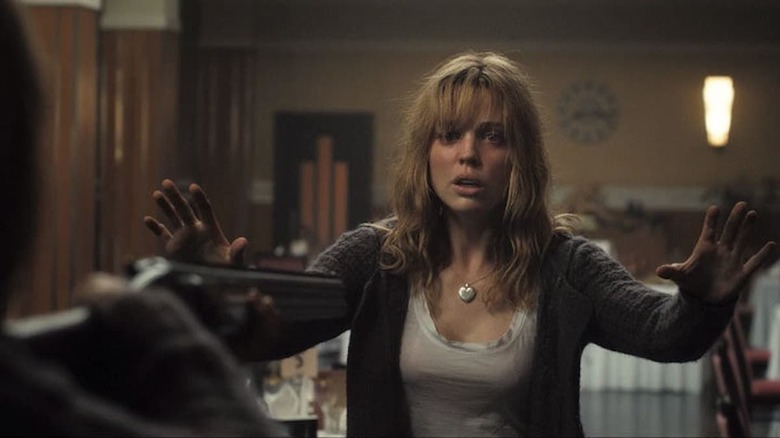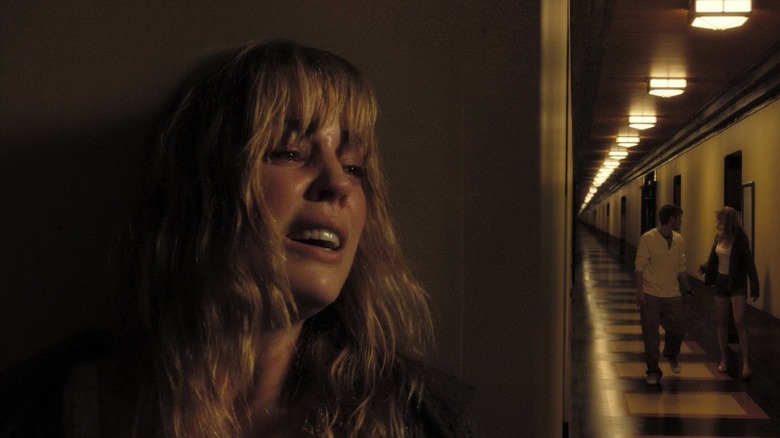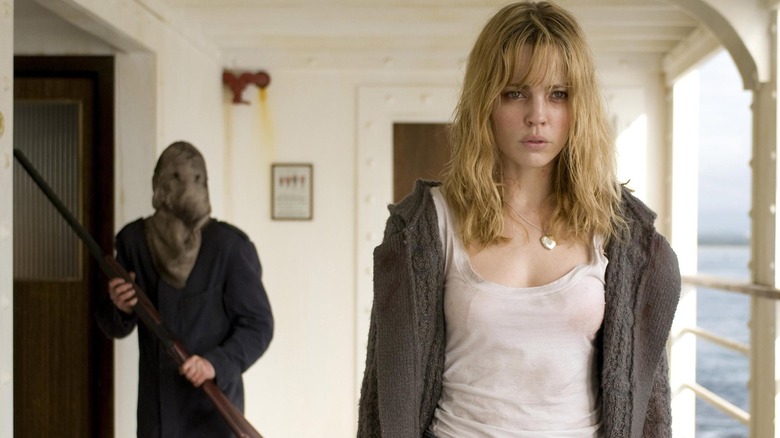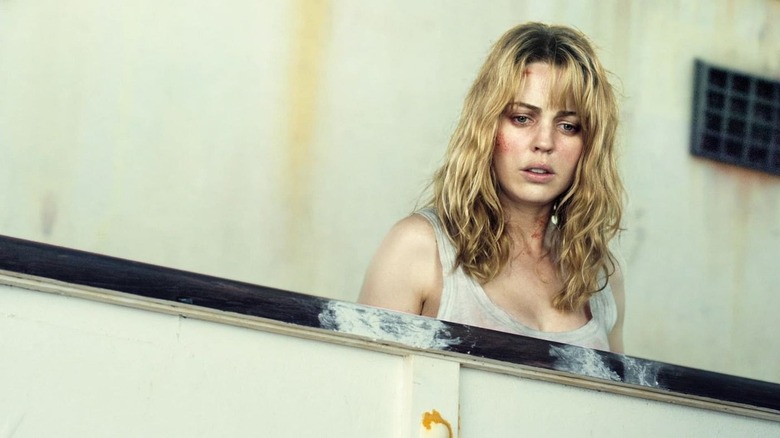Triangle Ending Explained: The Definition Of Insanity
We may receive a commission on purchases made from links.
2020 might have been the year of the time-loop movie, but Christopher Smith's 2009 horror film, "Triangle," is one of the best to ever do it. The underseen film has seen a resurgence in popularity as the time-loop film as a style of storytelling has expanded beyond classics like "Turn Back the Clock," "The Twilight Zone," and most famously, "Groundhog Day."
In "Triangle," a young mother named Jess (Melissa George) is struggling to adjust to raising her autistic son, Tommy (Joshua McIver), on her own. She has a planned day trip on a friend's boat, but strange little coincidences occurring throughout the day start to feel like devastating inevitabilities. As time continues to loop and realities begin to fold in on each other, making sense of the film can feel overwhelming if you're not used to the timey-wimey weirdness of a film like "Triangle."
Considering the events take place at sea, many have speculated that "Triangle" is a movie about the phenomenon of the Bermuda Triangle, where superstitious people have theorized aircrafts and ships have disappeared under mysterious circumstances when passing through. There's also the fact the name of the ship featured in the film is the Aeolus, named for the figure in Greek mythology who was the keeper of the winds and king of the mythical floating island of Aeolia. The film also is largely centered on three locations — Jess' home, the Aeolus, and a sailboat called the Triangle — which creates sort of a three-pointed time loop ... or a triangle, if you will. There's a lot of symbolism and double meanings hidden within this British movie, but it's also a film with an ending that leaves no clean-cut answers for the viewer at home. Let's explain what happens at the end of "Triangle" and what it all possibly means for Jess.
What you need to remember about the plot of Triangle
Like "Happy Death Day," "Palm Springs," and "Lucky," Christopher Smith's "Triangle" is a time-travel movie in the form of a time-loop movie, where Jess has seemingly been living out the same boat ride over and over again. However, the film focuses on a single run of the loop, rather than a series of days with differing outcomes. The loop starts with Jess yelling at her son Tommy before being distracted by the ringing of her doorbell. She goes to investigate, but no one is there. Jess later gets in a car and arrives to get on a boat, explaining to her friend Greg (Michael Dorman) that Tommy is now at a special school for children with autism and will not be attending the trip.
While aboard, a storm is approaching, and Greg picks up a distress signal from a woman claiming that someone is killing everyone on board, but they are unable to get her location. The storm eventually capsizes Greg's boat, forcing the survivors to board a seemingly deserted passing ocean liner called Aeolus. Jess feels an extreme sensation of déjà vu as they explore the ship, eventually spotting someone watching them, and Greg's friend Victor (Liam Hemsworth) chases them down.
Jess returns to the dining room and notices the food from earlier is now rotting. Victor, returns, covered in blood, and tries to kill Jess. Gunfire is heard and Jess finds Gred dead, with passengers Sally (Rachael Carpani) and Downey (Henry Nixon) claiming that Jess is the one who shot him. Suddenly a masked shooter appears and kills them, chasing down Jess. This is where the loop converges, as Jess realizes that she is the masked killer, and there are at least two other versions of herself on board, and several versions of everyone else as well. It seems as if the loop restarts once everyone on board is killed. At least, that's Jess' theory.
What happened at the end of Triangle?
At the end of "Triangle," Jess is now aware that she's trapped in a time loop and is determined to set everything right. After failing to convince a time-loop copy of herself to kill everyone on board, she's knocked overboard. Jess then awakes on the shore, realizing that it's the same morning on repeat. She makes her way home and witnesses her original self losing her patience and screaming at Tommy about his autism. She is finally seeing how monstrous and harmful her actions are to her son. Desperate to change the course of events in the loop, she sneaks up on her counterpart and kills her, shoving the body in the trunk of the car.
She, pretending to be the Jess that was just screaming at Tommy, grabs him and takes him in the car. On the drive, a seagull hits the car windshield, and Jess disposes of the bird. Unfortunately, where she dumps the bird reveals a pile of dead seagulls, a sign that she's in the loop. In an attempt to flee the scene, Jess crashes into a truck, and Tommy is killed on impact. She leaves the accident site, which includes "her" dead body (the version of herself she killed), realizing that it looks as if mother and son were both killed in the crash.
An onlooker sees Tommy's body and Jess overhears the expression, "Nothing can bring him back." Suddenly, a taxi driver approaches the scene and Jess hops in and heads to the harbor. She once again joins the others on Greg's boat, hoping that if she does something different, she may be able to prevent the inevitable and save both her son and herself from tragedy.
What the ending of Triangle means for Jess and Tommy
Unfortunately, if you're looking for a concrete "this is what the ending of 'Triangle' absolutely means with 100 percent certainty" answer, you're going to be disappointed. "Triangle" does not end with a crystallized interpretation, and viewers must use their own critical thinking skills to determine what the film is trying to say at the end. We see multiple versions of Jess throughout the film, but it's important to remember that these are all the same Jess, just at different points of a recurring time loop.
The film follows one loop of Jess, but there's no telling how many times she's repeated this loop, or how long she's been trapped inside of it. The movie posits that many of the events in the time loop are unavoidable, like how she'll become the masked killer on the ship due to the line, "You have to kill them; it's the only way to get home." Unfortunately, this also implies that Tommy will always be dead, after overhearing the words of a bystander saying, "Nothing can bring him back."
And yet, there's something almost optimistic about the ending of "Triangle" as Jess seemingly voluntarily returns to the ship to experience the loop once again, indicating that she's not willing to give up and will do anything it takes to try and bring Tommy back. She says toward the end of the film that she promises to do better by her son, and her choice to try the loop again is a testament to that dedication. Then again, Albert Einstein once said, "The definition of insanity is doing the same thing over and over and expecting different results." However ... love makes you do crazy things.
Another possible explanation of Triangle's ending
As "Triangle" intentionally refuses to provide any definitive answers, there's also the possibility that Jess is trapped in a hopeless predicament. As the audience, we want her to escape the loop, save her son, and live happily ever after ... but the film seemingly has different ideas. Jess returns to the ship to again repeat the events of the day at the end of the film, and it's unclear if she realizes that her mission is futile, or if she's aware that chances are grim and has elected to try anyway. At the beginning of the film, someone rings the doorbell when Jess is at home with Tommy, and we later learn that the person ringing the doorbell is Jess herself after escaping the Aeolus. This implies that at some point, Jess will make it home, but does this mean that she's destined to repeat this process over and over and over again from now until forever?
There's a chance that Jess is incapable of breaking the loop, but the reason why she's there in the first place remains unknown. There are those who believe this eternal purgatory is penance for not being a better mother to her son, while others find this to be merely a tragic coincidence, the same way that those rumored to have disappeared in the Bermuda Triangle were just regular folks going about their business. Either way, this interpretation of the ending is one that feels far more bleak and cynical than the tenacity of motherhood, and a reminder that despite the sci-fi elements of time looping, "Triangle" is wholeheartedly a horror movie for more reasons than just Jess becoming a masked killer.
Has Christopher Smith explained the ending of Triangle?
Sadly, many interviews from 2009 have been sucked into the void of the early internet age, but director Christopher Smith spoke with The Fan Carpet about how "Triangle" came to be. "I just had this idea, what if when they're arriving on the boat, they see someone and that's one of the people from the boat and that's the twist," he said. He shared that when he pitched the film to studios, an executive at a festival told him it sounded like a great ending, but Smith had to explain that this reveal would take place early on.
"So it was my ambition to make the twist come, so you think you're watching this movie about character and then you're on a boat and then you're like, whoa and suddenly it all changes and it's turned on its head." He also pointed out that the house featured in the film has the same design as the ship as well as the same numbering, so the film even hints at the possibility that she never even left the house and that all of the events were in her head. "But I don't want there to be a twist where at the end you go, 'Ugh,'" he explained. "I wanted it to be a riddle at the end so that if you spot that, great, but if you don't want to accept that and you want to think it's a Bermuda Triangle movie, that's fine."
Smith isn't about to give any definitive answers, because again, that sort of defeats the entire purpose of the movie. However, he did explain that the ending of the film is intentional. "She has to be a blank canvas, she has to have lost her memory and I like the idea of two-hander at the end," he said. "She's either going in proactively and it'll all change, or she's got no memory and it's all starting again."
Will there ever be a sequel to Triangle?
It's been almost a decade and a half since "Triangle" first debuted, so it's highly unlikely that we'll see a sequel to the film at this point. Granted, stranger things have happened, like how "Top Gun: Maverick" came 36 years after the original. However, "Triangle" wasn't a massive box-office success nor was it a film that completely changed the landscape of pop culture. This is the sort of film that is loved by horror fans "in the know," so it's not like there are legions of fans begging for a return. Additionally, despite its expansive, time-looping story, "Triangle" is a pretty contained story. There are questions left up to interpretation of the viewer because, at its core, it's a horror mystery.
That said, part of the film's appeal is not having a definitive answer as to what happened to Jess after the credits roll. If there were to be a sequel, the film would either need to focus on someone else entirely caught in a similar time loop or return to Jess' story. If she was still caught in the loop after all these years, Melissa George would need to be digitally de-aged to look as if she did in 2009. This would also mean that the film would need to answer what happened with Tommy, which would lessen the impact of the original film's ending.
"Triangle" is ultimately a tale about the exhaustive lengths a mother will endure to secure the safety of her child and part of the film's power is knowing that Jess is going to keep trying until she has absolutely nothing left. This film's ending is a perfect example of "show, but don't tell." We don't need to see Jess' reunion with Tommy to feel the weight of its importance.
